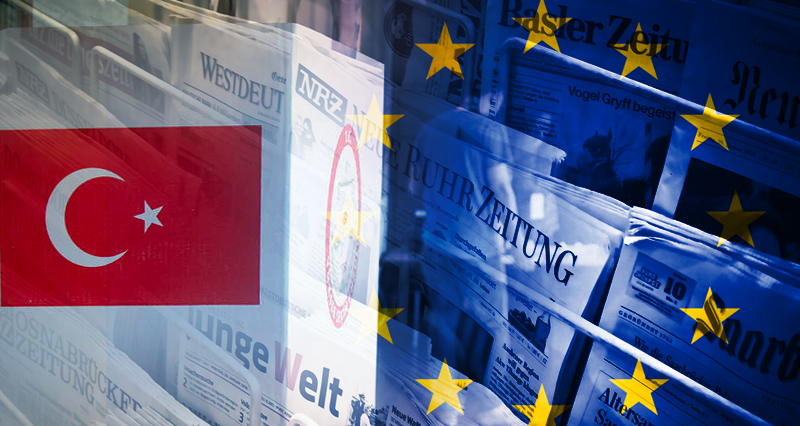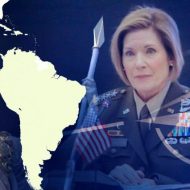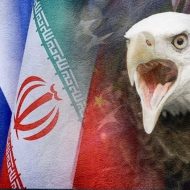The presidential election in Türkiye has attracted worldwide attention, especially from Western countries, due to its many aspects. Some even refer to it as “the most important election of 2023” in the world.
Türkiye’s politics, economy, geopolitics, and future possibilities have been extensively discussed in various articles, interviews, and television broadcasts. Through a comprehensive review of print and visual media, we present the prominent issues, emphasis, and interpretations of the election covered in the US and Western Europe.
Predictions before May 14: Erdoğan loses
Prior to the election, predictions suggesting that Erdoğan would lose the presidential election were dominant in the publications. Many sources state that according to “most polls,” Kılıçdaroğlu is leading.
For instance, referring to the surveys conducted in Türkiye, some sources, like Katharina Willinger, the Istanbul correspondent of German ARD television, in her article on May 14th in Tagesschau, writes the following:
“He (Kılıçdaroğlu) is hardly seen on television, yet his popularity is high. The ORC research company, considered highly reliable, published the latest poll results before the election. Kılıçdaroğlu is leading with 51.7%, while Erdoğan trails behind with 44.2%.”
Poor economy, earthquakes, authoritarianism, polarization
The predictions that Erdoğan will lose the election are mainly based on the following reasons: economic problems, the earthquake that hit 11 provinces on February 6th and the government’s mismanagement during this period, authoritarian rule and erosion of democracy, polarization in society, institutional favoritism and weakening of institutions, and a leader and government that have grown tired after 20 years. Explanations and examples are provided for each of these reasons, sometimes supported by interviews with Turkish citizens.
Ishaan Tharoor from The Washington Post can be read as a summary of these predictions and even expectations at some points two days after the election:
“A day before Türkiye’s elections, liberal pundits and analysts inside and outside the country sensed the possibility of an epochal turning point. After two decades in power, President Recep Tayyip Erdoğan seemed weak — his image of competent, stable leadership diminished by years of economic dysfunction and a backlash over poor governance and corruption that followed the devastating earthquake which ravaged a huge tract of southern Türkiye. Polls showed opposition leader Kemal Kilicdaroglu firmly ahead in the first round presidential race. Erdoğan’s time, it seemed, was running out.”[1]
After May 14th: Bewilderment and the search for reasons
It can be easily seen that many of those who believed there were numerous reasons for Erdoğan’s loss experienced a certain level of surprise after May 14th.
Didier Billion, the deputy director of the Institute of International and Strategic Relations (Institut de Relations Internationales et Stratégiques, IRIS) in France and author of two books on Türkiye (“La Turquie, un partenaire incontournable” and La Turquie d’aujourd’hui au miroir de l’histoire,” co-authored with Bastien Alex), explains the following in an interview published on May 16th:
“There is still an element of surprise. Some of my Turkish friends were saying, “This is it, Erdoğan will be defeated in the first round.” While I was not convinced of such a defeat, I thought that Kemal Kılıçdaroğlu would at least be in the lead. This result is quite surprising because despite a very worrying economic crisis, a suffocating atmosphere and a certain power fatigue, Erdoğan seems to be ahead by far. Moreover, the fact that his coalition won an absolute majority in the parliamentary elections.”[2]
Stability, “strong country”, nationalist rhetoric, nostalgia for the Ottoman Empire
Didier Billion mentions two reasons for Erdoğan’s victory. The first reason is the preference for the “party of stability” (le parti de la stabilité, le parti de l’ordre), which is seen as capable of overcoming the economic and social challenges that the country is facing. The second reason is Erdoğan’s perception as someone who can assert Türkiye’s interests in a highly unstable region with geopolitical challenges and is not hesitant to confront global powers.
Samim Akgönül, the Director of the Department of Turkish Studies at the University of Strasbourg, who commented on the matter for France 24, highlights reasons such as nationalist rhetoric, polarizing discourse, and violent and insulting statements. He also claimes that the role of Turkish identity and Islam, the perception of Türkiye as a major country, Ankara’s presence on the international stage, and a longing for the Ottoman Empire also played an important role.
In her article in Politico titled “The West may have to learn how to live with Erdoğan”, Natalie Tocci emphasizes the necessity for the European Union to “abstain from doubling down on the finger-wagging critique of Turkish democracy — which, amid an increasingly nationalistic society, has a boomerang effect at most.” She writes that the EU needs to learn to “to live with these countries” like Türkiye, which “doesn’t see eye to eye with Europe and the West” by “reflecting on what it can and cannot do.”[3]
The point commonly-held: Türkiye and Erdoğan on the world stage
In many analyses, Türkiye is depicted as being in decisive positions on the world stage.
Natasha Turak, in her article on CNBC on May 19th, describes Türkiye as a country “located at the geographic crossroads of East and West, with a population of approximately 85 million,” “the second-largest army in NATO”, “hosting 4 million refugees”, and “playing an important role in geopolitics through its mediation in the Russia-Ukraine conflict”.[4]
Dorothée Schmid, who established the “Contemporary Türkiye Program” at the French Institute of International Relations in 2008, states in her article in Le Monde on May 17th that in a worrying international environment, President Erdoğan’s nationalist roadmap gives confidence to the Turkish people.
Schmid cites Türkiye’s space program, which aims to achieve the first contact with the Moon in 2023, as an example and states that “Türkiye has great international ambitions.” She writes that Erdoğan is known as a strong individual who staunchly defends Türkiye’s interests, regardless of what NATO partners may think, and projects his influence on the global scale. According to Schmid, Erdoğan continues his mission to “reposition Türkiye on the world map and restore pride to the Turks.”
Natasha Turak, in parallel with the mentioned view, states that Erdoğan “frequently pushed back against the West, winning the loyal support of many Turks — as well as non-Turkish people — around the Muslim world.”[5]
In an interview published in Le Figaro on May 16th, Claire Koç makes an interesting comparison: “(Türkiye) is trying to take France’s place everywhere with a strong economic presence. Erdoğan sees himself as De Gaulle, wanting to become an indispensable figure in international politics.”[6]
On May 6th, Der Spiegel featured Erdoğan on its cover with the headline “Unbeatable” (Der Unbesiegbare). However, considering the broken and crumbling Ottoman throne he is sitting on, and the underlying text (“Will it be departure or chaos? What will happen if Erdoğan loses?”), the cover could implying other meanings as well.
Erdoğan as a model of authoritarianism
One of the most commonly used terms to describe Erdoğan leadership is “authoritarianism.”
In an article titled “Erdoğan against Anti-Erdoğan” published on May 6th on Deutschlandfunk, Erdoğan and his administration are described as follows: “Erdoğan has gained control over almost all areas of social life, administration, and the state apparatus, and filled important positions with his supporters. He has significant control over the judiciary, the military, the police, and a large part of the media. Opposition and criticism are suppressed. Erdoğan is inclined towards nationalism and is a populist who shows little remorse.”
The same analysis states that Türkiye may be at a turning point: “Türkiye may be at a turning point. The parliamentary and presidential elections on May 14th will determine whether the incumbent President Recep Tayyip Erdoğan will continue his authoritarian path or the opposition will be given a chance to democratize the country.”[7]
Erdoğan’s “authoritarianism” has been the subject of many research and analysis. In fact, some comments suggest that Erdoğan is not just a follower in terms of authoritarianism, but rather a “model” for other leaders. Understanding the “authoritarianism” of countries and leaderships such as Venezuela, India, Iran, Hungary, China, and Russia, Erdoğan’s last 10 years in power is considered to be illumunating. For example, in an article for Le Monde on May 17th, Ahmet İnsel gives new names to the governance in Türkiye: “Erdoğanism” and “hyper-presidentialism”.[8]
Similarly, Lale Akgün, a member of the Social Democratic Party in Germany, warns in an interview with Deutschlanfunk on May 12th that if Erdoğan wins the elections again, “Türkiye will be like Iran.”[9]
Kılıçdaroğlu: The candidate of “normalization” with NATO and the West
The foreign policy that Türkiye will pursue as a result of the elections is also a hot topic.
Almost everyone who writes on the subject agrees that Kılıçdaroğlu will be a leader more in tune with NATO and the Western world in general. In recent years, according to the articles, Türkiye has distanced itself more and more from NATO, forged closer ties with Russia, and the path to the European Union seems to have been completely sealed off, according to the articles, which also discuss the “possibility of U-turn”.
Marc Pierini, former EU ambassador to Türkiye, wrote in Le Monde on May 17th, “In the future, Türkiye will have to evaluate its position between the Atlantic Alliance and a disruptive Russia.” Pierini states that regardless of who wins the election, the new president’s relationship with NATO and the EU will be “one of the sensitive choices.”[10]
In a section where Le Monde’s Moscow correspondent, Jégo Marie, answered reader questions, he responded to a reader’s question on May 15th:
- “From a foreign policy perspective, the opposition candidate did not declare a significant departure from Erdoğan’s? Is there a consensus on this in Türkiye?”
- “If the opposition had been elected, there would have been a different foreign policy, initially more peaceful and rational. Relations with Europe, the United States, and NATO would return to normal, and it would be possible to reconsider many complex issues. Relations with Moscow would become more institutionalized than they are today. The relationship between Erdoğan and Putin is very personal, based on a magical connection. For example, there are no transcripts of their conversations, so we don’t know what they say to each other. If it were an institutionalized relationship, we would know.”
In his commentary to Deutschlandfunk, American scholar Nicholas Danforth, who writes about Western Asia in publications such as The Atlantic, Foreign Affairs, Foreign Policy, New York Times, and Washington Post, emphasizes that the path to democracy will be long. He believes that even in the best-case scenario of Erdoğan’s removal from power, the “extremely nationalist and anti-Western” climate created by the president will continue to haunt the country.[11]
[1] https://www.washingtonpost.com/world/2023/05/16/erdogan-turkey-culture-war-right-wing-authoritarianism/
[2] https://www.tf1info.fr/international/elections-turquie-erdogan-est-il-bien-parti-pour-rester-a-la-tete-du-pays-face-a-kilicdaroglula-ogan-2257234.html
[3] https://www.politico.eu/article/west-learn-how-live-recep-tayyip-erdogan-turkey-presidential-election/
[4] https://www.cnbc.com/2023/05/19/turkish-election-erdogan-rival-kilicdaroglu-faces-tough-time-as-economy-struggles.html
[5] https://www.cnbc.com/2023/05/19/turkish-election-erdogan-rival-kilicdaroglu-faces-tough-time-as-economy-struggles.html
[6] https://www.lefigaro.fr/vox/monde/pourquoi-les-turcs-habitants-en-allemagne-et-en-france-votent-massivement-erdogan-20230516
[7] https://www.deutschlandfunk.de/praesidentschaftswahl-mai-tuerkei-erdogan-kilicdaroglu-100.html
[8] https://www.lemonde.fr/idees/article/2023/05/17/erdogan-continue-de-repondre-a-une-aspiration-sociale-fortement-ancree-dans-la-societe-turque_6173676_3232.html
[9] https://www.deutschlandfunk.de/was-kommt-wenn-erdogan-bleibt-interview-mit-lale-akguen-spd-dlf-375eb223-100.html
[10] https://www.lemonde.fr/idees/article/2023/05/24/demain-la-turquie-devra-evaluer-sa-place-entre-l-alliance-atlantique-et-une-russie-disruptive_6173693_3233.html
[11] https://www.deutschlandfunk.de/praesidentschaftswahl-mai-tuerkei-erdogan-kilicdaroglu-100.html








Leave a Reply